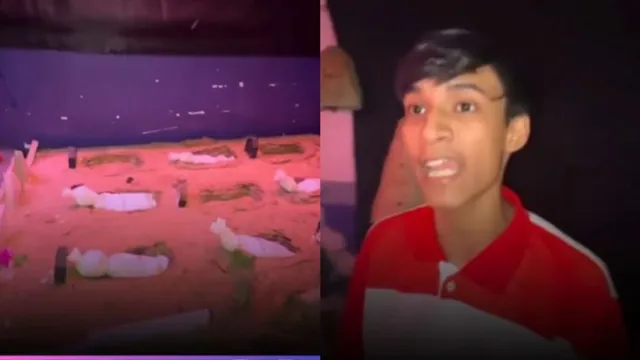- By Shivangi Sharma
- Sun, 02 Nov 2025 11:52 AM (IST)
- Source:JND
A video of a Pakistani school student presenting a “Doomsday Science Project” has ignited intense debate online, with thousands of social media users questioning the country’s educational priorities. The clip, which has gone viral, shows the student describing an apocalyptic scene he claims will occur on the “Day of Qayamat,” or Day of Judgment.
In the project, the student references fire raining from the sea, the sun turning pitch black, cities burning, stars falling to Earth, volcanoes erupting, lava flows, and even the dead rising from their graves. The model includes miniature structures engulfed in flames, erupting volcanoes, and streets covered in “destruction.”
Social Media Reactions
The video has drawn strong criticism across platforms. One user commented, “The future of children in Pakistan is in darkness,” while another mocked, “Israel has started the day and night of judgment.” Others took aim at the content taught in classrooms, asking why children are exposed to religious fear instead of scientific knowledge.
View this post on Instagram
Another enraged user wrote, “Where children should be taught about science and technology, in Pakistan, negative thinking is being instilled.” A separate sarcastic comment said, “Madrassa students,” linking the student’s concept to religious schooling. Many questioned the portrayal of the dead rising, with one joking, “Their souls will be with 72 virgins.”
The recurring theme among comments centered on fear: “Why do they always fantasise death, destruction, and chaos?” one user asked. Another summed it up bluntly: “Studying for destruction.”
The video has sparked broader conversations about the state of education in Pakistan. Despite outrage in the comments, the video has amassed more than 6,000 likes.
Pakistani school textbooks have previously gone viral for including chapters on the Kashmir issue that accused Hindus and Sikhs of carrying out genocide against Muslims, while portraying India as an “arrogant nation” disrupting regional stability. Found in Class 8 and 9 curricula, these narratives sparked concern over how education may be influencing and shaping students' political and communal perceptions.

